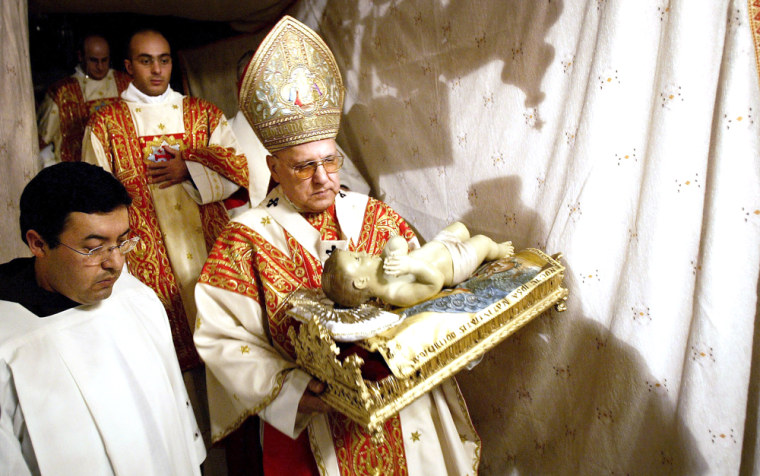Thousands of pilgrims and a new Palestinian leadership celebrated Christmas in the town of Jesus’s birth on Saturday with prayers for peace after the death of Yasser Arafat.
But Israeli restrictions on Palestinians entering Bethlehem and a barrier Israel is building in the West Bank cast a shadow over the celebrations.
At midnight mass, moderate leader Mahmoud Abbas filled the seat that had been left empty for Arafat for three Christmases past because Israel had stopped him travelling to the West Bank town — accusing him of fomenting bloodshed, a charge he denied.
Welcoming Arafat’s successors, the Latin Patriarch for the Holy Land, a Palestinian, urged all parties to end violence.
“It has lasted too long,” Michel Sabbah, Pope John Paul’s representative, told the Church of the Nativity gathering.
“It is time for Palestine and Israel to defeat the evil of violence and give birth to a society of brothers and sisters in which nobody is subject to another, nobody is occupied by another and nobody threatens the security of another.”
Abbas, who wants an end to fighting and to resume peace talks with Israel, is expected to win a presidential poll on Jan. 9 to pick a successor to Arafat.
Amid the incense and prayers, the silver-haired Abbas in his business suit cut a profile far removed from ex-guerrilla Arafat, who favored olive uniforms and a checkered headdress. Abbas, like Arafat and most Palestinians, is Muslim.
“We extend our hand to the Israelis. We want to negotiate, to reach peace — a peace built on justice and right,” Abbas told a meeting in Bethlehem on Friday evening.
Israeli Prime Minister Ariel Sharon has also called 2005 a year of opportunity for peace in the Middle East.
Despite cold downpours, visitors from around the world flocked to Manger Square, marking a modest revival in the pilgrim flow after a previous four years in which Bethlehem was often paralyzed by violence, blockades and curfews.
The square was enlivened by twinkling white lights draping rows of small trees. Foreign choirs sang carols and flashes from digital cameras filled the air.
Hope tempered by encirclement
At the roadblock on the pilgrimage route in from Jerusalem, Israeli troops posted a sign: “Happy Holidays and a Happy New Year.” But as before, they checked papers of travelers in only one direction at a time, causing long waits as traffic built up.
Sections of the barrier run up to the road entering Bethlehem, lending a forbidding air. Israel says the barrier keeps suicide bombers out of its cities. Palestinians call it a step to annex occupied territory.
“The wall is being built eight meters (26 feet) high around Bethlehem. It’s not easy for us to send a message of Christmas joy to the world when our town is being inexorably encircled by concrete, barbed wire and Jewish settlements,” said Jack Giacaman, whose family has run shops in Manger Square for generations.
Some pilgrims said they felt a new atmosphere of hope in Bethlehem.
But merchants and hoteliers who have been ruined by years of bloodshed said that while business was up somewhat, they were disappointed most pilgrims did not stay overnight or snap up souvenirs like olivewood nativity scenes as they once did.
Many shops remained bereft of customers and by Christmas morning Manger Square had reverted to a drab parking lot, with vendors chasing visitors and some little boys begging for money.
“The future should be quieter but it doesn’t look that auspicious,” said Father Severino, the Polish manager of a pilgrimage hotel next to the ancient Church of the Nativity.
“Abbas is not very popular and there’s doubt how much control he will have (over militants). And Bethlehem is steadily losing its Christians too, which is pretty sad.”
